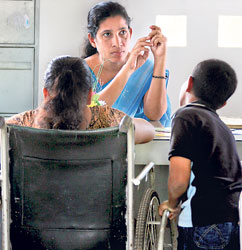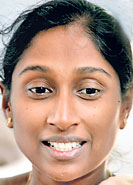With hope on her face, Thushari Asha, along with her 10-year-old boy, Lakshitha, are seated in a cosy house-like office, in Moragalla, Beruwela, to lay before the officers her numerous woes.
A victim of the tsunami, who has had one leg and also some toes of the other foot amputated, her son has had problems with his legs from birth. “We have done two hip operations for Lakshitha but he cries that his legs hurt. I have to send him to school in a trishaw and that costs me about Rs. 2,000,” says Thushari, adding that she has “come here” to seek help to start a swayang rekiyawa (self-employment project) by rearing goats.
 |
| Thushari and Lakshitha talking to Child Rights Promotion Officer Sandarekha Liyanage. |
A mother of three children, life is tough for Thushari, whose husband “works on a boat” owned by someone else. “Even last week, they went out to sea but returned empty-handed because the engine broke down. He gets some money only if they catch fish and they don’t go fishing everyday,” she laments, reluctantly admitting that most often they face starvation.
Last Tuesday, when we met her, the children had been bought three buns while she and her husband had nothing for breakfast.
Whereas normally she would have had to go to one officer at the Beruwala Divisional Secretariat, here at the Moragalla Social Care Centre, a “multidisciplinary team” will see to most of her needs, during one meeting, least of all by giving a sympathetic ear to her many problems……..the need for some sort of conveyance to take her boy for his regular medical check-ups to Colombo, the threat of being evicted from a home donated by a kind German after the tsunami, the inability to buy such basics as books, bags and shoes not only for her son but also for her two daughters who are 15 and 11 years old.
While Thushari chats with one officer, 17-year-old Kithshani Shehara of the Nenasara Children’s Society of Magal Kanda is meeting another officer to discuss not only a New Year Sports Festival they are hoping to organize but also an awareness programme for parents on how to deal with the difficult teen years of their offspring.
What are these Social Care Centres, 27 in all, which dot the coastal areas from Panadura in the south to Kinniya in the east?
“Manned” or more aptly “womanned”, because a majority of the officers are efficient and dedicated women, who work long past their duty hours, the Social Care Centres were the brainchild of the Ministry of Social Services and Social Welfare, originally with the idea of helping the families of migrant workers but ultimately focusing on tsunami-affected areas
Flashback to 2006. When the ministry put forward this idea to prevent people, especially women, from having to go from pillar to post to get even a simple matter sorted out, to UNICEF and Save the Children, Sri Lanka, they got on board on a 50-50 basis, providing funding for construction as well as equipment and furniture.
 |
| Assistant Divisional Secretary, Jithani Athukorale. |
However, well-furnished offices were just not enough and there was a need to change the attitudes and thinking of the officers who would deal with the people. It was then that the International Centre for the Advancement of Community Based Rehabilitation (ICACBR) of the Queen’s University in Canada, with funding from the Canadian International Development Agency got involved to assist with the “governance” aspect. Headed by Executive Director Malcolm Peat, the ICACBR has trained a core group of public officers and a few NGO representatives who have then gone back to their areas and trained the officers who are deployed at these Social Care Centres.
The ultimate in decentralization, these revolutionary Social Care Centres are fully operational now, actively working in every nook and corner of the villages coming under them.
At Moragalla under the leadership and guidance of the Assistant Divisional Secretary, Jithani Athukorale, the team comprises two Social Service Officers, an Elderly Rights Promotion Officer, a Social Development Assistant, a Counselling Assistant, a Women’s Development Officer, a Child Rights Promotion Officer, two Assistant Disaster Management Coordinators and a Unit Assistant to handle administration.
The Assistant Divisional Secretary explains that there is a sense that any secret especially what the women “unburden” to the officials would be kept confidential.
“When they come to the Divisional Secretariat, the chances of someone from their village getting to know their personal problems will be high, says dynamic Mrs. Athukorale, who has advised her officers how to tackle even very sensitive issues of a personal nature that people come with.
“Every Friday we have a case conference where we discuss people’s problems and the officer handling one issue would get the support of the others,” says Mrs. Athukorale.
Opened on June 12, 2007, this Social Care Centre has dealt with more than 350 requests or problems covering 82 Grama Niladhari areas, each comprising about three villages.
Most issues are related to economic difficulties, says Child Rights Promotion Officer Sandarekha Liyanage, with parents unable to send their children to school. So the centre is acting as a conduit to get used but good clothes and tap businessmen for stuff such as books and colour pencils, which they hand out to children.
Most of those who come to Elderly Rights Officer Kumuduni Gamage are seeking the Senior Citizens’ ID, while Social Service Officer Mangala Asoka de Silva supports the disabled by providing them with wheelchairs, crutches etc.
“Just yesterday, a woman whose husband had hanged himself came here for help in starting a self-employment project,” says Mangala, who while recommending organic farming, realized her need for counselling and got his colleague, the Counselling Assistant Rinooza Sahabdeen to talk to her.
The day that Women’s Development Officer Thushara Tharangani had to report at the Divisional Secretariat was also the day that a weeping woman came looking for her. “Finding that I was not here, she came to the DS office, held my hand and wanted to talk to me,” she says. “They treat us like friends.”
Sometimes when a woman comes with a plea to help re-build her house affected by the heavy winds or floods, the officer who visits the area finds that there is a child who is not going to school or an elder who needs a pair of spectacles, says Mangala.
At the centre is also conducted vocational training programmes for youth with Down’s Syndrome, along with parents who have come together to support such children. “We have trained them to twist pahan thira, make paper bags and also door-mats,” says the group’s head, G.D. Karunathilake.
The centres face some shortage of facilities, such as a vehicle like a three-wheeler to go into interior villages (now they double up on bicycles) and also the danger of a public transfer scheme where trained officers are moved out, The Sunday Times learns.
Overall, however, this “integrated ” approach has worked wonders, is the verdict of Assistant Divisional Secretary Athukorale who, heavy with child, still hops a bus to be at the centre as much as possible, while tackling the heavy workload at the DS office. |


